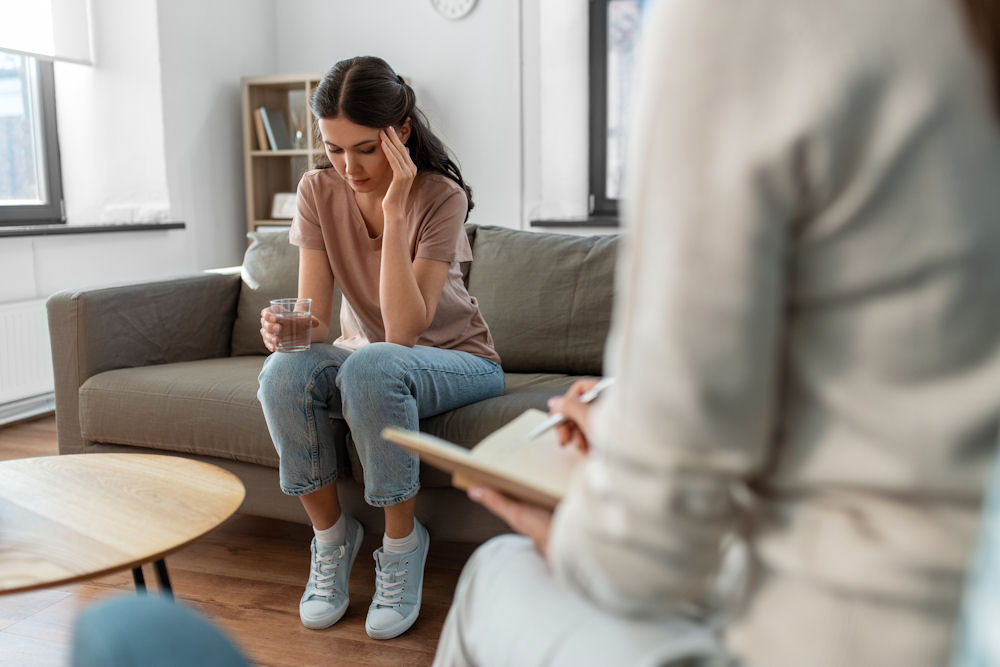
Substance abuse is used as a way to help relieve the unpleasant symptoms related to depression. Individuals try to cope by self-medicating with drugs and alcohol. However, choosing alcohol or drugs that are not particularly prescribed for depression will lead to negative symptoms becoming exacerbated. This leads to an endless cycle of addiction. Collaboration in the treatment between both depression and addiction is vital in order for someone to recover from this dual diagnosis.
1.) One disorder feeds the other: In a basic sense, this means that if you are suffering from the one you are simply more likely to suffer from the other. This is because individuals who suffer from depression are likely to seek out drugs and alcohol to cope. Conversely, substance abuse will lead to depression through drug or alcohol withdrawals, or it can alter brain chemistry after continued use and bring about a clinical depressive disorder.
2.) Brain cells sensitize over time: This theory is related to sensitizing that occurs to brain neurons from substances like alcohol and cocaine. This means with increased sensitivity the mood becomes altered with less and less substance. It also means that time between depressive episodes decreases and substance abuse increases. This effect encourages individuals to continue self-medicating.
3.) Genetic factors: Research has also proven that a person’s genetics also play a role. Those individuals who have a family history of struggling with mood disorders or substance abuse will likely also suffer. Since these disorders feed into each other, it doesn’t matter if previous family members have suffered from one or both disorders. If there is a genetic history of either, a person is vulnerable to both.
The relationship between depression and addiction is complex and bidirectional. Depression can lead to addiction by making substances seem like a desirable way to escape from negative emotions. Addiction can also lead to depression by causing changes in brain function that lead to mood swings and impulsive behavior. Additionally, the chronic stress of withdrawal from substances can trigger depression in people who are susceptible.
Since these disorders feed into each other so easily it is often difficult for treatment specialists to determine which disorder is the root cause. A comprehensive treatment plan will need to determine which symptoms are related to depression and which are related to the addiction.
Differences Between Depression and Addiction
While depression and addiction often share similar symptoms, there are some key ways to differentiate between the two disorders. People suffering from depression will often have negative thoughts about themselves, their lives, and the future. These negative thought patterns can be so severe that they make it difficult for a person to function on a day-to-day basis. In contrast, people with addiction tend to fixate on using substances as a way to escape from their problems.
What is Depression?
Depression and addiction share many of the same signs and symptoms and therefore it can be difficult to determine which disorder a person may be suffering from. It’s essential to speak with a mental health professional to make a correct diagnosis.

Signs and Symptoms of Depression
- Isolation, withdrawal from loved ones
- Loss of interest in favorite hobbies
- Sleeping too much or not enough
- Overeating or appetite loss
- Fatigue
- Anxiety
- Guilt
- Hopelessness
- Anger
People who suffer from depression are not always aware that they are in fact suffering from a mental health disorder and may even be scared to talk to someone. In 2020 roughly 51.4% of people reporting having a mental health disorder actually sought treatment. If you consider that is ONLY the percentage of the population that was aware of their mental health disorder, this statistic is even more startling.
Finding relief from symptoms of depression does not need to come in the form of substance abuse. There are plenty of treatment options that can help individuals cope in a healthy manner.
Types of Depression
Major Depressive Disorder (MDD) is diagnosed when a person experiences a depressed mood or anhedonia (loss of joy) plus four other symptoms for at least two weeks. These other symptoms include significant weight loss or gain, insomnia or hypersomnia, psychomotor agitation or retardation, fatigue or loss of energy, feelings of worthlessness or excessive guilt, impaired concentration or indecisiveness, and recurrent thoughts of death or suicide.
MDD is the most common type of depression. It was estimated in 2020 that roughly 21 million American adults suffer from a major depressive episode which is about 8.4% of the US adult population.
This type of depression is characterized by long-term, low-level depression. It is also sometimes called dysthymia. Persistent depressive disorder (PDD), is diagnosed when a person experiences a depressed mood for at least two years (one year for children and adolescents). In addition to the depressed mood, PDD sufferers must also experience two other symptoms from the list above for at least two years.
It is estimated that 1.5% of American adults suffer from PDD in any given year.
This type of depression is characterized by extreme highs and lows in mood. These episodes are also known as manic episodes. During a manic episode, a person may feel extremely happy and have lots of energy. They may also act impulsively and make poor decisions.
During a depressed episode, a person with bipolar disorder may feel hopeless and worthless. They may also have little energy and trouble sleeping. Bipolar disorder affects about 2.8% of American adults in any given year.
Seasonal affective disorder (SAD) occurs as a result of the change in seasons. It typically begins in the fall and continues into the winter months. People with SAD may feel depression only during certain times of the year.
Symptoms of SAD may include depression, anxiety, irritability, fatigue, and trouble sleeping. SAD affects about 5% of American adults.
This type of depression occurs during pregnancy or after childbirth. It is more common than most people think, affecting up to 1 in 7 women who give birth each year.
Symptoms of peripartum depression include sadness, anxiety, exhaustion, and difficulty bonding with the baby. If you are pregnant or have recently given birth and are experiencing any of these symptoms, please speak to your doctor.
Untreated depression during pregnancy can lead to poor prenatal care, low birth weight, and preterm delivery. It can also put the mother at risk for postpartum depression, which can be detrimental to both her and the child’s health.
Treatment for Depression and Addiction
Determining the best treatment program will depend on the person’s level of addiction, treatment history, and medical history. The severity and type of depression will also be taken into consideration. However, behavioral health professionals will recommend either an inpatient rehab program or an outpatient form of care.
Types of Therapy for Depression and Addiction
Cognitive behavioral therapy (CBT) is one of the most common and effective treatments for depression. CBT helps people learn how to identify and change negative thinking patterns that contribute to feelings of depression.
Interpersonal therapy (IPT) is another type of therapy that can be used to treat depression. IPT focuses on helping people improve their relationships with family, friends, and co-workers. This type of therapy can also help people learn how to cope with major life changes, such as divorce or the death of a loved one.
Group therapy is another option that can be beneficial for people dealing with depression and addiction. In group therapy, people meet with a therapist and other group members who are dealing with similar issues. Group therapy provides a support system and allows people to share their experiences and feelings with others who understand what they are going through.

Medication for Depression and Addiction
People who are dealing with depression and addiction may also be prescribed medication to help with their addiction. Medication can help to reduce cravings and withdrawal symptoms, making it easier for people to stick to their treatment plans. Medications used to treat addiction include naltrexone, buprenorphine, and methadone.
Dual diagnosis treatment is an important part of recovery for many people who are struggling with depression and addiction.
First City Recovery Center Offers Comprehensive Treatment for Depression and Addiction
If you or someone you love is struggling with depression and addiction, please contact us today to learn more about our dual diagnosis treatment program. Depression and addiction can be difficult to deal with, but there are treatments available that can help.

















